| Article ID | Journal | Published Year | Pages | File Type |
|---|---|---|---|---|
| 6008981 | Clinical Neurophysiology | 2013 | 8 Pages |
â¢This paper focuses on the neurophysiological processing of personal-emotional words in healthy adults and adults with post-stroke aphasia.â¢Personal-emotional words are processed in a different and more preserved way even after stroke.â¢This study may support the development of diagnostic and therapeutic tools for people after stroke and for other brain related disorders.
ObjectiveAuditory evoked potentials (EP) were used to examine the neural processing of personal-emotional and neutral words, in a group of 14 people with post-stroke aphasia and an equal sized control group to determine whether the EP differed between groups and word types.MethodsEffects of the emotional value of the words and participant group were assessed on EP. Latencies and amplitudes of EP were analyzed for the two groups (aphasia and control) in response to word type (emotional and neutral).ResultsN1 amplitudes were smaller and P2 and P3 were delayed in the aphasia group, for both word types, indicating effects of stroke on processing of both neutral and emotional words. P3 amplitudes were larger for emotional words in both groups. These differences in late cortical responses between word types for both groups suggest distinct neural networks involved in the response to emotional and neutral words, even with post-stroke language impairment.ConclusionsThe neurophysiological processing of affective speech in aphasia has been revealed. This opens up the interpretation of these results to the critical assessment and therapeutic identification of emotional language in people with aphasia.SignificanceThis study has implications not just for aphasia but allows for further exploration of other neurological conditions.
